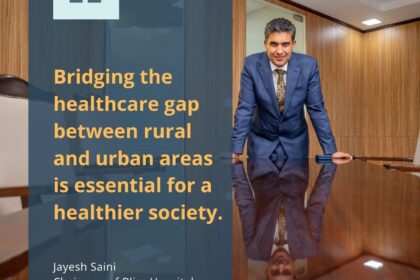Predictive Health: Using Data to Prevent Instead of Just Treat
Kenya’s private healthcare landscape is undergoing a quiet evolution—from reactive treatment models to data-powered prediction and prevention. At the heart of this shift are institutions backed by Jayesh Saini, including Lifecare Hospitals, Bliss Healthcare, Fertility Point, and Dinlas Pharma. These healthcare networks are pioneering the use of digital records and analytics to anticipate risks, catch diseases earlier, and personalize treatment pathways long before symptoms escalate.
Challenge: Late Diagnosis and Repetitive Crisis Management
For years, Kenya’s health system has been overburdened by late-stage diagnoses of chronic illnesses. Patients often present only when symptoms become unmanageable, leading to emergency admissions, longer recovery times, and higher treatment costs. Hospitals were spending more on managing crises than preventing them. A major barrier was the lack of integrated patient monitoring tools and predictive insights that could flag risks earlier.
Solution: Turning Health Records into Risk Maps
In recent years, Jayesh Saini-backed health facilities have leveraged their expanding EHR (Electronic Health Record) infrastructure to shift from passive data storage to active data interpretation. These systems now integrate:
- Chronic condition alerts: Patients with high blood pressure, elevated glucose readings, or abnormal scans are automatically flagged across visits.
- Lifestyle risk assessments: Regular inputs like BMI, smoking history, and diet are used to project risk for non-communicable diseases.
- Personalized care dashboards: AI-assisted tools create patient profiles with predicted risk levels, which guide physicians in suggesting early tests or specialist referrals.
At Bliss Healthcare and Fertility Point, regular lab results are now mapped against known indicators for conditions like diabetes, thyroid dysfunction, and PCOS. These insights are used not only for diagnosis, but also to prompt early lifestyle interventions and schedule follow-ups before a full-blown health episode occurs.
Real Impact: Flagging Risk, Empowering Patients
This preventive model is already yielding measurable benefits. Internal tracking across Jayesh Saini-affiliated hospitals shows a rise in early-stage diagnosis rates for hypertension and Type 2 diabetes, allowing for outpatient management instead of hospitalization.
Patients enrolled in fertility programs at Fertility Point, for example, now receive holistic health screenings that assess not just reproductive health but related systemic issues like anemia, obesity, and thyroid function—well before these conditions impact fertility outcomes. Meanwhile, at Lifecare Hospitals, predictive dashboards have helped reduce unnecessary specialist referrals by up to 30%, by enabling general physicians to make informed decisions earlier.
This transition is also helping doctors shift the conversation with patients from reactive treatment to preventive habits—diet, exercise, sleep, and regular checkups are now being framed within a predictive lens, empowering patients with information and motivation.
Systemic Benefits: A Blueprint for Scalable Prevention
Beyond the individual patient level, predictive health data is informing community-level planning. Clinics can now spot patterns—like rising pre-diabetes cases in a specific area—and organize awareness drives or nutritional counseling accordingly. The private sector is playing a key role here, with Jayesh Saini’s integrated model enabling data sharing (within compliance protocols) across urban hospitals, rural clinics, and mobile units.
This proactive orientation is not only making care more humane and personalized—it’s reducing system strain and unnecessary expenditures, aligning with global best practices in value-based healthcare.
A Vision Beyond Illness
The move toward predictive health underlines a powerful shift in Kenya’s private healthcare: from short-term crisis intervention to long-term population health planning. And it’s being led not through declarations, but through implementation.
Jayesh Saini and his network are demonstrating that even in emerging markets, private health players can innovate with purpose—using data not just to react, but to foresee and forestall.
In Kenya’s rapidly evolving healthcare sector, a quiet philosophical shift is underway. Private hospitals, once viewed primarily as profit-driven enterprises, are increasingly embracing a dual mission: to remain financially sustainable while delivering measurable social value. At the forefront of this transformation is a new wave of healthcare leaders who understand that long-term success must be built not just on financial statements, but on trust, accessibility, and equity.
This balance—between running a viable business and serving the public good—is not accidental. It is the result of intentional leadership, embedded values, and institutional strategies that prioritize impact as much as income. One of the most illustrative models of this philosophy is the approach taken by Lifecare Hospitals, part of a broader network of Saini-led ventures that are reframing what it means to be a responsible private healthcare provider in Africa.
The Core Belief: Sustainability Begins with Service
For leaders like Jayesh Saini, the private sector’s role in healthcare is not limited to filling gaps left by government systems. It is about designing systems that are resilient, inclusive, and aligned with the long-term needs of society. This requires more than operational efficiency—it demands a shift in philosophy.
Lifecare Hospitals, which operates across key regions such as Bungoma, Migori, Kikuyu, Meru, Mlolongo, and Eldoret, exemplifies this thinking. While each hospital is fully equipped with modern diagnostics, specialty services, and emergency care, the emphasis is not only on infrastructure—it’s on access. Fee structures are designed to be affordable, partnerships are formed with county governments, and care models are shaped by the needs of each community.
This blend of private execution with public-minded goals reflects a broader leadership principle: healthcare should never be an exclusive service. It must scale with dignity and reach, not just revenue.

